|
|
|
Sort Order |
|
|
|
Items / Page
|
|
|
|
|
|
|
| Srl | Item |
| 1 |
ID:
181697
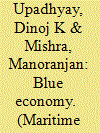

|
|
|
|
|
| Summary/Abstract |
Blue economy, which promotes sustainable usages of ocean resources for economic growth and development, as well as preservation of the health of ocean ecosystem, has become a crucial element of the broader ecosystem of sustainable and inclusive development. The desire to sustainably harness the potential of ocean and marine resources has been amply visible at the national and global level. Technological innovations, investment and multilateral cooperation have further been facilitating progress in the sectors of blue economy. Placed in a central position in the Indian Ocean and with a vast exclusive economic zone (EEZ), India has substantial potential for tapping marine resources and blue economy could emerge as the paradigm of development in the future. New Delhi has taken many initiatives to promote blue economy activities and development of modern infrastructure for greater connectivity, international collaboration and trade facilitation. Further, it is seeking wider multilateral cooperation in areas of financing, technology transfer, capacity building and knowledge sharing. This paper underlines the importance of blue economy in a broader framework of sustainable development and analyses India’s foreign policy orientation towards blue economy. Finally, it also discusses cooperation between India and European countries in the sectors of blue economy.
|
|
|
|
|
|
|
|
|
|
|
|
|
|
|
|
| 2 |
ID:
132043
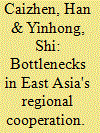

|
|
|
|
|
| Publication |
2014.
|
| Summary/Abstract |
The Problems Facing Regional Cooperation in East Asia great efforts are being made in East Asia to improve regional and Gsub-regional multilateral cooperation in the face of a bottleneck. The key issues are listed below:
First, there is a mismatch between size and effectiveness. Generally speaking, the larger the cooperation organization the more con?icts that arise and thus the less effective they are. Because of efforts by countries such as the U.S.,2 Australia, Japan, and India to further their strategic or diplomatic interests, these organizations are growing in regional coverage, which causes issues to become diversified and in turn causes the organizations to lose sight of their mission. Subsequently, many regional or trans-regional multilateral organizations such as APEC, the East Asia Summit (EAS), and the ASEAN Security Forum are increasingly playing aless effective role. For example, APEC summits and the EAS usually just
end up with a symbolic proclamation without any substance or ' Han Caizhen is Professor at the School of lntemational Studies, Renmin University of China. Shi Yinhong is Counselor at the Counselors' Office at the State Council and Professor at the School of lntemational Studies, Renmin University ot'China
|
|
|
|
|
|
|
|
|
|
|
|
|
|
|
|
| 3 |
ID:
098974
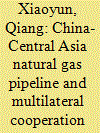

|
|
|
| 4 |
ID:
133093
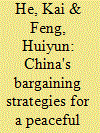

|
|
|
|
|
| Publication |
2014.
|
| Summary/Abstract |
Applying bargaining theory of international conflicts, we examine the successes and challenges of China's strategic choices in its ascent after the Cold War. We suggest that China needs to alleviate information and commitment problems in order to rise peacefully. Since 2008, China's "peaceful rise" strategy has faced serious challenges because of its "assertive turn" in diplomacy. We argue that China has not alleviated or settled these two problems successfully because of its ambiguous "core interest" diplomacy and undecided attitude regarding multilateral institutions in resolving the maritime disputes. China should engage in rule-based, institution building, such as a security community between China and ASEAN, to reinforce its peaceful rise commitments.
|
|
|
|
|
|
|
|
|
|
|
|
|
|
|
|
| 5 |
ID:
133596
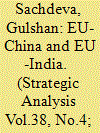

|
|
|
|
|
| Publication |
2014.
|
| Summary/Abstract |
More than a decade has passed since the European Union (EU) signed strategic partnerships with China (2003) and India (2004). The EU's 'honeymoon' with China was over within a few years while cooperation on truly strategic issues with India is yet to emerge. The core of both these relationships is still economics. While China has taken full advantage of the EU's institutional mechanism through more than 56 sectoral dialogues to promote its geopolitical goals and also to neutralise European concerns about democracy and human rights, Indian policy makers and analysts remain sceptical about Europe's role in global affairs. As a result, they have not bothered to use European capacities to promote their own interests through this partnership.
|
|
|
|
|
|
|
|
|
|
|
|
|
|
|
|
| 6 |
ID:
133597
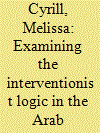

|
|
|
|
|
| Publication |
2014.
|
| Summary/Abstract |
At first glance, there was no coherent regional and international response to the transitions triggered in the Arab world since December 2010 as external players, both regional and international, had to confront with unceasing alarm the rapidity of change threatening to unravel in critical Arab states. However, as events in the region progressed, a pattern emerged to the external responses, one that was as predictive as it was differentiated. This was exemplified by the counter-revolutionary forces that were assembled against the transition in Bahrain on one hand, and the aggressively interventionist posture adopted towards Libya and Syria on the other. This inconsistency between activism and support for the supposedly democratic spirit of armed resistance groups, but inaction and silence towards the crushed non-violent public opposition elsewhere, clearly betrayed the interest-driven motivations of the external actors involved.
|
|
|
|
|
|
|
|
|
|
|
|
|
|
|
|
| 7 |
ID:
124380
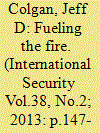

|
|
|
|
|
| Publication |
2013.
|
| Summary/Abstract |
What role does oil play in international security? While the threat of "resource wars" over possession of oil reserves is often exaggerated, the sum total of the political effects generated by the oil industry makes it a leading cause of war. Between one-quarter and one-half of interstate wars since 1973 have been connected to one or more oil-related causal mechanisms. Eight distinct mechanisms exist: resource wars, in which states try to acquire oil reserves by force; petro-aggression, whereby oil facilitates domestic political control of aggressive leaders such as Saddam Hussein or Ayatollah Ruhollah Khomeini; externalization of civil wars in petrostates; financing for insurgencies, such as Iranian oil money to Hezbollah; conflicts over potential oil-market domination, such as the United States' conflict with Iraq over Kuwait in 1991; control over transit routes, such as shipping lanes and pipelines; oil-related grievances, whereby the presence of foreign workers in petrostates helps extremist groups such as al-Qaida recruit locals; and as an obstacle to multilateral cooperation, such as when an importer curries favor with a petrostate to prevent multilateral cooperation on security issues. Understanding these mechanisms can help policymakers design grand strategy and allocate military resources
|
|
|
|
|
|
|
|
|
|
|
|
|
|
|
|
| 8 |
ID:
161462
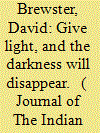

|
|
|
|
|
| Summary/Abstract |
There is a growing understanding among maritime security practitioners of the importance of Maritime Domain Awareness (MDA) as an essential enabler of maritime security. This article describes Australia’s efforts to develop an integrated national MDA system that brings together data and intelligence from a range of military and civil agencies and commercial sources to which a risk-based assessment is applied. This has become an essential tool to combat transnational maritime security threats in the Indian Ocean and elsewhere. But inherent limitations of national MDA systems are also pushing Australia and other countries to cooperate in trying to improve MDA. This paper then examines ways in which Australia can promote MDA cooperation in the Indian Ocean. It considers the effectiveness and limitations of current and proposed multilateral information sharing arrangements in the region. It concludes that Australia should primarily focus on working with selected Indian Ocean partners to enhance information sharing and help develop integrated national MDA systems.
|
|
|
|
|
|
|
|
|
|
|
|
|
|
|
|
| 9 |
ID:
113957
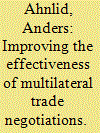

|
|
|
|
|
| Publication |
2012.
|
| Summary/Abstract |
The informal WTO ministerial meeting in July 2008 brought the long stalled Doha Round to the verge of a breakthrough. The reason for its final failure was substantive and not related to the negotiating procedures, which previously had contributed to meager results and failures in the round. The meeting was conducted using procedures that ensured a considerable amount of trustworthiness, transparency and legitimacy, which in turn contributed to effectiveness in the process. Thus, the meeting solved many, albeit not all, outstanding issues on the path towards agreement on so-called modalities for agriculture and industrial products, which in turn would have been necessary for a final successful conclusion of the Round. The 2008 July negotiations demonstrated that complex large-scale multilateral negotiations can be handled procedurally in an acceptable and successful way. The article advances a neglected interpretation of the July meeting, and provides lessons for both future WTO negotiations and multilateral negotiations in other policy areas.
|
|
|
|
|
|
|
|
|
|
|
|
|
|
|
|
| 10 |
ID:
133598
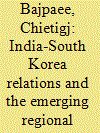

|
|
|
|
|
| Publication |
2014.
|
| Summary/Abstract |
South Korean president Park Geun-hye visited India in January 2014 after India and South Korea marked 40 years of diplomatic relations the previous year.1 These developments symbolise a burgeoning relationship between two of Asia's leading economies and democracies. However, they have added significance as Asia undergoes a shift in the strategic balance of power. This has been prompted by the US rebalance or strategic pivot towards Asia, the rise of China and its proclivity to adopt a more assertive position on regional issues, and the emergence of the 'Indo-Pacific' as a new geopolitical frame of reference. In this context, rising Asian powers such as India and South Korea hold an increasingly significant place in meeting the region's development and security objectives.
|
|
|
|
|
|
|
|
|
|
|
|
|
|
|
|
| 11 |
ID:
190974
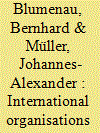

|
|
|
|
|
| Summary/Abstract |
This article examines early antiterrorism negotiations within international organisations (IOs) and their outcomes. It assesses how international cooperation emerged in specialised, regional, and global IOs and provides a long-term overview from the 1960s until the late 1980s. Drawing on primary sources and scholarly literature, this article identifies the patterns, trends, and key characteristics of the successfully adopted measures. It demonstrates that early multilateral antiterrorism efforts faced several obstacles (sovereignty, national interests, mistrust, and geopolitics), and, therefore, international negotiations fared better when following a piecemeal approach within specialised or regional organisations, where the focus could be on specific aspects of terrorism (e.g., hostage-takings). A key characteristic of the successfully adopted antiterrorism instruments was the aut dedere aut iudicare principle, which allowed states to maintain perceptions of sovereignty by either extraditing or trying a suspect. The antiterrorism efforts examined here were mostly preventative in design and worked to discourage future terrorists by ensuring that safe havens were closed and that perpetrators faced justice. The shift to suicide terrorism in the 1990s would instead require new international antiterrorism efforts to focus on pre-emptive strategies, depriving terrorists of the means to carry out attacks. The roots of these measures were laid in the 1980s.
|
|
|
|
|
|
|
|
|
|
|
|
|
|
|
|
| 12 |
ID:
186389
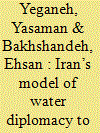

|
|
|
|
|
| Summary/Abstract |
Many countries of the world are suffering from the adverse consequences of water scarcity. The United Nations has estimated that, by the middle of the present century, about 7 billion people in 48 countries, mostly from Southwest Asia, will encounter water scarcity. This may be expedited by the adverse consequences of climate change and global warming which would escalate the risk of war and conflict over transboundary resources. The present research explores the ways water diplomacy can mitigate the dire effects of water scarcity and promote “treaty making” and “institution building” as well as multilateral cooperation on shared waters. The focus is on Iran's water diplomacy with neighboring countries over transboundary resources to forge cooperation and hamper conflict. Our findings suggest that Iran's water diplomacy is constructed on principles of “goodwill and cooperation,” “non-significant harm,” “environmental protection,” and “exchange of data and information” on shared water resources with its neighboring riparian states. Such a model, which has resulted in no dispute between Iran and some of its neighbors such as Pakistan, Turkmenistan, and Armenia in recent years, demonstrates the broader benefits of Iran's approach to water diplomacy and paves the way for stronger cooperation in other areas of mutual interest. Additionally, it encourages multilateral engagement and “hydrosolidarity” within the framework of agreements and the formation of joint “water commissions” for the equitable and reasonable distribution of water among riparian states in line with the 1997 UN Watercourses Convention.
|
|
|
|
|
|
|
|
|
|
|
|
|
|
|
|
| 13 |
ID:
133070
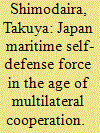

|
|
|
|
|
| Publication |
2014.
|
| Summary/Abstract |
Isaiah Berlin's essay The Hedgehog and the Fox-made famous by the adage "The fox knows many things, but the hedgehog knows one big thing"-explores the pros and cons of a highly focused defense strategy.1 The hedgehog curls up in a ball and defends itself. Hiroshi Doi, former professor at the National Defense Academy of Japan, advocates a "hedgehog-style defense" for Japan, claiming that the country's postwar security policies can still defeat any "sly fox" confronting the nation.2 However, given the emergence of an increasingly complex global security environment, it may be argued that Japan's "defense-only defense policy" is no longer valid. Indeed, must Japan remain a hedgehog forever?
|
|
|
|
|
|
|
|
|
|
|
|
|
|
|
|
| 14 |
ID:
139282


|
|
|
|
|
| Summary/Abstract |
The authors present a prognosis of the policy of five Central Asian countries in order to identify the main problems associated with the essential absence of development of real, deep, and extensive forms of multilateral cooperation in the region. The main accent is placed on identifying/explaining the key reasons/factors of the unwillingness of Kazakhstan, Kyrgyzstan, Tajikistan, Turkmenistan, and Uzbekistan to cooperate with each other, as well as on demonstrating the negative consequences of the absence of the necessary level of trust, cooperation, and integration in the region.
|
|
|
|
|
|
|
|
|
|
|
|
|
|
|
|
| 15 |
ID:
144477
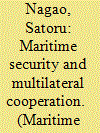

|
|
|
|
|
| Summary/Abstract |
This paper focuses on multilateral naval cooperation. To understand the importance of multilateral naval cooperation, it is necessary to answer three questions: what kind of problems are we facing; what kind of cooperation mechanisms are effective to deal with these problems; and which one of them is the most important? Naval cooperation amongst friendly countries needs to primarily deal with imminent threats such as the arms race and power game in this region, non-state threats and concerns about the future. To effectively deal with these threats, countries have engaged in confidence-building mechanisms by sharing information regarding various events, and by building capacity to deal with emerging threats and uneasy situations. All of these methods elaborate the importance of multilateral cooperation, and the navies of countries should cooperate actively in this network to maximise outcomes. Hence, there is great potential in the multilateral framework of the “New Alliance” which is developing in the region.
|
|
|
|
|
|
|
|
|
|
|
|
|
|
|
|
| 16 |
ID:
173646
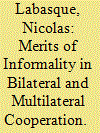

|
|
|
| 17 |
ID:
089248
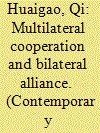

|
|
|
| 18 |
ID:
103310
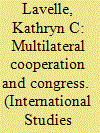

|
|
|
|
|
| Publication |
2011.
|
| Summary/Abstract |
International relations has demonstrated the contribution national legislatures make toward global cooperation. Yet what explains variation in securing funding for International Organizations (IOs) through the US Congress? I derive a theory of interaction from studies of interest groups in American politics and argue that the cause of funding delays and their resolution can be found where groups advance policy reform agendas through Congressional channels. Using process tracing of successive case studies, the article presents evidence from International Development Association (IDA) replenishments. It situates the rationality of members of Congress and other national and transnational actors within the context of a formal, domestic political institution whose budgetary process is deeply conflicted and subject to constant change. Thus, the theory offered here could be used by either rationalists or constructivists to support a material or ideational explanation for Congressional action.
|
|
|
|
|
|
|
|
|
|
|
|
|
|
|
|
| 19 |
ID:
060849
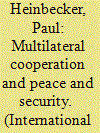

|
|
|
| 20 |
ID:
111917
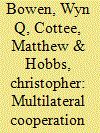

|
|
|
|
|
| Publication |
2012.
|
| Summary/Abstract |
The second Nuclear Security Summit on 26-27 March 2012 in Seoul provides an important opportunity to gauge international consensus on the threat posed by nuclear terrorism, and to evaluate progress in the development of multilateral cooperative efforts to prevent it. However, the 'nuclear security' agenda has long been complicated by the complexity of the issues it covers and diverging perceptions of the risks and threats in this area. Further complications involve the politics that have constrained the development of formal cooperative approaches and the patchwork nature of the existing multilateral policy architecture. While the Summit is unlikely to go very far in mitigating these complications, it will nonetheless provide impetus to multilateral efforts to strengthen the international regulative framework in this area and, in the process, to develop the norm of nuclear security. Beyond Seoul several priorities stand out. Nuclear safety and nuclear security need to be approached in a more balanced way by the International Atomic Energy Agency, and it must also be allowed to adopt a more joined-up, and less stove-piped, approach to nuclear governance across the safeguards, safety and security fields. Developing countries that are concerned by growing demands for strengthened nuclear security arrangements need greater reassurance from those proposing them that these will not undermine their rights under the Nuclear Non-Proliferation Treaty to pursue civil applications of nuclear energy. Greater progress also needs to be made in universalizing the key nuclear security conventions and their amendments, and attention should be given to how momentum and high-level political buy-in to the nuclear security agenda can be maintained in the future both as part of, and beyond, the Nuclear Security Summit process.
|
|
|
|
|
|
|
|
|
|
|
|
|
|
|
|
|
|
|
|
|